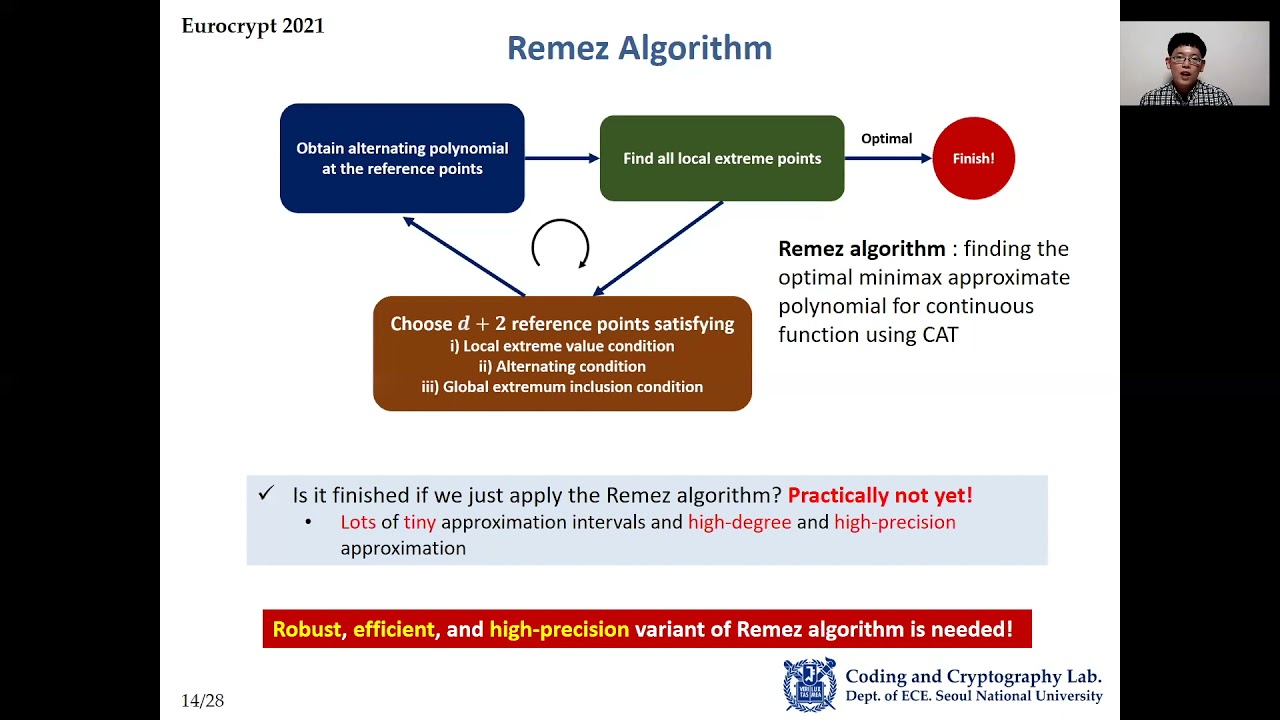Welcome to the resource topic for 2020/552
Title:
High-Precision Bootstrapping of RNS-CKKS Homomorphic Encryption Using Optimal Minimax Polynomial Approximation and Inverse Sine Function
Authors: Joon-Woo Lee, Eunsang Lee, Yongwoo Lee, Young-Sik Kim, Jong-Seon No
Abstract:Approximate homomorphic encryption with the residue number system (RNS), called RNS-variant Cheon-Kim-Kim-Song (RNS-CKKS) scheme, is a fully homomorphic encryption scheme that supports arithmetic operations for real or complex number data encrypted. Although the RNS-CKKS scheme is a fully homomorphic encryption scheme, most of the applications with the RNS-CKKS scheme use it as the only leveled homomorphic encryption scheme because of the lack of the practicality of the bootstrapping operation of the RNS-CKKS scheme. One of the crucial problems of the bootstrapping operation is its poor precision. While other basic homomorphic operations ensure sufficiently high precision for practical use, the bootstrapping operation only supports about 20-bit fixed-point precision at best, which is not high precision enough to be used for the reliable large-depth homomorphic computations until now. In this paper, we improve the message precision in the bootstrapping operation of the RNS-CKKS scheme. Since the homomorphic modular reduction process is one of the most important steps in determining the precision of the bootstrapping, we focus on the homomorphic modular reduction process. Firstly, we propose a fast algorithm of obtaining the optimal minimax approximate polynomial of modular reduction function and the scaled sine/cosine function over the union of the approximation regions, called an improved multi-interval Remez algorithm. In fact, this algorithm derives the optimal minimax approximate polynomial of any continuous functions over any union of the finite number of intervals. Next, we propose the composite function method using the inverse sine function to reduce the difference between the scaling factor used in the bootstrapping and the default scaling factor. With these methods, we reduce the approximation error in the bootstrapping of the RNS-CKKS scheme by 1/1176~1/42 (5.4~10.2-bit precision improvement) for each parameter setting. While the bootstrapping without the composite function method has 27.2~30.3-bit precision at maximum, the bootstrapping with the composite function method has 32.6~40.5-bit precision.
ePrint: https://eprint.iacr.org/2020/552
Talk: https://www.youtube.com/watch?v=Zai10IgGMww
See all topics related to this paper.
Feel free to post resources that are related to this paper below.
Example resources include: implementations, explanation materials, talks, slides, links to previous discussions on other websites.
For more information, see the rules for Resource Topics .
